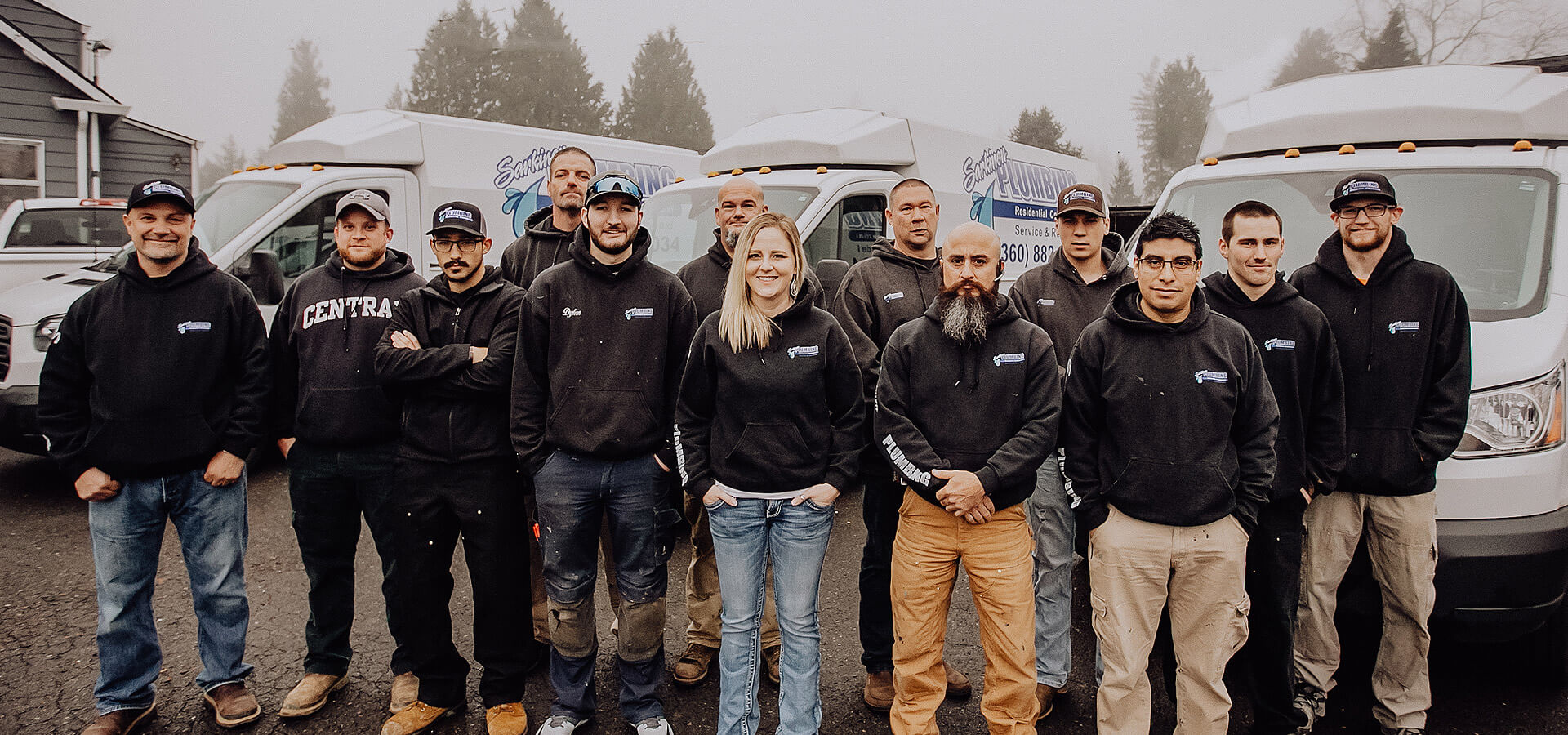- Vancouver 360-369-3586
- Portland 503-925-3504
- Fast No Obligation Estimate
- Home
- About
- Plumbing Services
- Emergency Plumbing
- Drain Cleaning
- Leak Detection & Repair
- Sewer Line Repair
- Repiping
- Trenchless Pipe Repair & Replacement
- Water Heater Repair
- Water Heater Installation
- Main Water Line Repair
- Main Water Line Replacement
- Garbage Disposal Repair & Installation
- Faucet & Fixture Installation
- Toilet Installation
- Trenchless Boring Services
- New Construction
- Commercial Plumbing
- Water Filtration and Softening
- Water Damage Restoration
- Service Area
- Reviews
- Coupons
- Contact Us

Are liquid drain clog products good or bad for your pipes?
by Sarkinen Plumbing | Dec 11, 2018
Anyone who has ever experienced a clogged drain in a sink, toilet or bathroom instinctively reaches for a drain cleaning product, such as Drano or Liquid Plumber, to try and get rid of the problem.
Usually, the clogs clear up and you’ll be free to go on with your day. But the question remains- is Drano or similar liquid plumbing cleaners bad for your pipes? Will there be long-term complications if you use them each time you have a plumbing problem?
Here’s a list of some of the dangers you’ll be facing when you use Drano/Liquid Plumber
Pipe Damage
One of the main reasons why you should hold off on that Drano is that it can be bad for your pipes.
First, let’s take a look at how a liquid drain cleaner works. Liquid Plumber and other drain cleaners unclog pipes via a caustic effect. The pH level of these solutions is somewhere around 14. When poured down the drain, the liquid breaks down organic material while releasing extreme heat and gas as a by-product.
The result? All the debris that’s clogging your pipes will disintegrate or melt, thereby fixing the mess. But there are a few side effects to this process. The acidity of the drain solution can be very hard on your pipes, no matter what material it is. For metal-based pipes such as cast iron, the acid solution can cause corrosion and advanced damage. Polymer pipes won’t be able to withstand extreme heat, which results in damage. In both cases, the pipes become much weaker and leaks, cracks, and holes will develop where there was none before.
Moreover, the overall lifespan of your pipes will be shortened. You invite a greater risk of a possible plumbing emergency, which can result in flooding, mold, and mildew or property damage.
Toilet Damage
Liquid Plumber not only causes internal plumbing damage but external damage as well.
If you find yourself faced with a pesky toilet problem, consider calling a professional plumber instead of going to the store to buy Drano. While it’s certainly true that drain cleaning products can work, using them puts your pipes, especially your toilet, at a huge risk for irreversible damage.
All chemicals that are put on a toilet tend to remain there and settle. If your pour Drano or Liquid Plumber, the caustic liquid will eventually reach the surface material, i.e., the porcelain and then start to heat up. The chemical reaction between drain cleaner and porcelain is unpredictable. In some cases, you could be looking at ugly surface cracks, and at worse the toilet could explode.
Why risk possible health hazards and toilet plumbing emergencies when you can call in a professional to unclog your pipes in the safest, most efficient manner? Not doing so is an invitation to more trouble.
Injuries
Drano and other liquid cleaners work as long as you follow the instructions on the label. This means that you should exercise care and caution when using them or risk a wide range of injuries.
The acidic solution can splash back onto the unsuspecting user and cause physical harm, including burns on the face, eyes, hair or body. What’s more, the gas that results from the chemical reaction can irritate and damage your lungs or nasal passages.
The bottom line is that Drano isn’t just bad for your pipes but it can be bad for your health as well if used improperly.
Recurring Plumbing Issues
Drano can work if you’re facing a clogged pipe and need to be somewhere else, but it’s just like that– a band-aid fix that’s sure to come back until you’ve had it checked and fixed by a professional plumber.
Sooner or later, the same problem will come back to haunt you, which is an indication that there’s a larger issue lying underneath. Using Liquid Plumber more than once in a few weeks or a month on the same fixture, i.e., the shower, kitchen sink or the roof drains won’t be cost-effective or easy on the wallet. What’s more, each time you use a drain cleaning product, you risk possible pipe damage and health injury, which will be more likely if you’re hurried and pressed for time.
Remember, continued use of Drano will corrode your pipes, weaken the inner pipe material and cause structural damage. If you experience the same issue twice in one week, place a call to a qualified plumber to have it looked at.
What You Can Do To Fix Clog Issues
Prevention Is Better Than Cure
Pipes can only take so much before they start acting up. The key to avoiding clogs is by being mindful of what you flush down the drain. Don’t put large food particles that are hard to break down, including bones, meat, raw vegetable and instead throw them in the wastebasket. Similarly, don’t pour grease, cooking oil and fats, but have a smaller bin disposal for them.
You can put drain catchers on your kitchen sink and shower drain to catch small things such as hair, plastic and other items that can get stuck on the inside of your pipes. The key to preventing future backups is in being mindful of the items you put down the drain, the toilet, and the sink. If it looks like it could cause a clog, then it’s better to throw it in the waste bin.
Try These Home Remedies
Sometimes, a kettle of boiling water can do the trick. Pour in hot water in the affected pipe to dislodge or loosen any buildup. You can also try a solution of vinegar and baking soda to clean the pipes regularly and prevent backups from happening. Both of these DIY methods are safer than using a commercial drain cleaner and can dislodge problematic debris before they turn into full-blown emergencies.
Call The Experts
Professional plumbers have the skills, tools and the know-how to get your pipes fixed in no time at all. Moreover, they can eliminate the cause of an issue if it’s recurring. Your clogs and backups can get fixed without having to resort to caustic, damaging drain cleaning solutions such as Drano and Liquid Plumber. You can get back to work or to important matters instead of having to DIY plumbing problems.
Recent Posts
- Vancouver 360-369-3586
- Portland 503-925-3504
- 9502 NE 72nd Ave Vancouver, WA 98665
It’s as easy as 1, 2, 3!
- Complete the form below so we can schedule your service appointment.
- You will receive an email confirming your appointment details.
- We will text you 30 minutes prior to the technician’s arrival.
Recognition & Awards
customer reviews
![]()
“Highly satisfied with all the work done! Pleasant, friendly worker’s—all work completed lightning-quick and stayed on site until all issues were fully taken care of! Hardly knew anyone was here after work was finished! Can’t go wrong with these people!! Will use again when needed!”
Leonard K.
Vancouver Location
Proudly Serving
Portland and Vancouver
from Wilsonville to Longivew &
Hillsboro to Gresham
UBI # 602-521-027
OR Contractor Lic# 170052 (CCB)
WA Contractor Lic# SARKIPI946MF
OR Plumber Lic# PB115
Customer Satisfaction
4.6 stars - Based on 227 Reviews
![]()
Vote Here For Sarkinen Plumbing in the 2020 Best Of Clark County!
Plumbing Services
- Emergency Plumbing
- Drain Cleaning
- Leak Detection & Repair
- Sewer Line Repair
- Repiping
- Trenchless Pipe Repair
- Water Heater Repair
- Water Heater Installation
- Main Water Line Repair
- Main Water Line Replacement
- Garbage Disposal Repair & Installation
- Faucet & Fixture Installation
- Toilet Installation
- Trenchless Boring
- New Construction Plumbing
- Commercial Plumbing
- Water Damage Restoration
SW Washington Service Areas
Oregon Service Areas
Contact Information
Sarkinen PlumbingVancouver
9502 NE 72nd Ave
Vancouver, WA 98665
Phone: 360-369-3586
Portland
Phone: 503-925-3504
Hours of Operation
Monday - Sunday 24-hours







